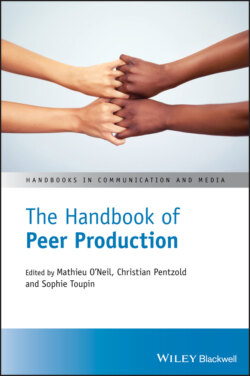Читать книгу The Handbook of Peer Production - Группа авторов - Страница 96
4.3 Critiques of Meritocracy in Geek Cultures
ОглавлениеIn theory, a meritocracy works when individuals have access to the same material and intellectual resources, and thus an equal opportunity from which to develop themselves and display their individual talent. In practice, access to these resources will always be unequal, since it is impossible for everyone to have the same time, financial resources, prior knowledge, and so on.
In particular, Alice Marwick (2013) and Marie Hicks (2016) have each criticized the belief in meritocracy in computer cultures in ways that can be extended to analyzing peer production. Although Marwick’s analysis is focused on startup culture (which in Bourdieu’s terms is a relatively “heteronomous” form of software production opposite the “autonomous” mode of FOSS production), her criticism of the “myth of meritocracy” is likely to be highly relevant to many peer production projects. As she argues, this belief is not only generally false but has disproportionate negative effects on women and people of different races, nationalities, ethnic and economic backgrounds. Beyond more obvious cases of sexism and racism, there will always be issues of unconscious bias that impact judgments of others and their contributions – Marwick notes in her interviews with both male and female Silicon Valley workers, for example, that female entrepreneurs and tech workers are often judged by their appearance rather than technical or business competence (Marwick, 2013, p. 264). The fact that Silicon Valley and workers in the US and European tech industries generally are perceived as favoring progressive politics hardly means that ethnocentrism and erroneous assumptions about others disappear (and rather that this ethnocentrism takes on new forms, see English‐Lueck, 2002). By upholding an ideology of meritocracy, open source communities and Wikipedia are less likely to see how participation and achievement are dependent on being able to fit in with a group that is overwhelmingly male and white. As Ford and Wajcman (2017) note, for example, participation in Wikipedia is often adversarial, unwelcoming to newcomers and suited to people with high degrees of technical skill, all of which favors its existing (mostly male) community and discourages women from taking part. Likewise, Nafus (2012) demonstrates the strong link between the meritocratic ideal in open source communities (present in claims that technical contributions “don’t have gender”) and the hostile attacks women often face in these communities when raising issues of sexism.
Marie Hicks’s work deals with the history of computing, but is equally relevant to the present topic. Hicks (2016) notes how highlighting the contributions of “genius” women in the history of computing – while noble in its intentions – strengthens the belief that success is a function of individual talent, obscuring inequalities of access and the fact that any individual contribution is dependent on a great deal of “hidden work” by countless others. This kind of critique raises the question of whether we should aim to improve ostensibly meritocratic systems favored in peer production and geek culture, or replace them with something else entirely.
In sum, this section has taken a closer look at meritocracy as a core value of FOSS and Wikipedia communities and the wider technological and media fields they operate within. Meritocracy is steeped in a liberal worldview that prizes individual achievement and equal opportunity, and as such we can see in peer production cultures an emphasis on both individual merit as well as the need to assist others. The meritocracies enacted by these communities can be found in crystallized form in various reputation systems and governance structures. However, meritocracy will always remain an ideal, or myth, given that power always ensures inequalities of access and various forms of inequality such as sexism and racism persist even in relatively progressive geek communities.
